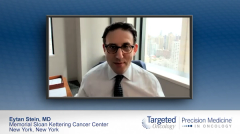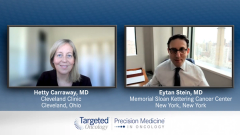
Treatment Options for Secondary AML
Eytan Stein, MD, reviews the available treatment options for patients with secondary AML or AML with myelodysplasia-related changes.
Episodes in this series

Eytan Stein, MD: Dr Carraway, what about the treatment options for patients with secondary AML [acute myeloid leukemia] or AML with myelodysplasia-related changes that are consistent with myelodysplastic syndromes [MDS]? I briefly talked about this, but maybe you could go into more detail.
Hetty Carraway, MD: Sure. Thank you for that. We alluded to this with the underlying antecedent hematologic disorders for patients who had an MDS before they were diagnosed with AML. Many of these patients have cytogenetic changes, whether it’s a deletion 5 or a deletion 7. Patients either present with a history of MDS that eventually evolves to become AML, or patients get diagnosed with an AML and we recognize that it looks and will likely behave like an antecedent MDS that has led to AML, or even a myeloproliferative disorder or some other hematologic malignancy.
In this setting, there was a study that was led by Jeffrey Lancet looking at CPX-351, which is a liposomal version of cytarabine and daunorubicin. It’s thought that it delivers the agents in a synergistic 5:1 drug ratio into the cells and is thought to be more exposed in the bone marrow niche or microenvironment. It’s thought to allow for sustained exposure in that area and [to] potentially be more effective for patients with treatment-related AML because of this study that was led by Jeffrey Lancet in 2018.
They looked at over 300 patients aged 60 to 75 years with newly diagnosed, high-risk treatment-related AML. They were randomized to receive either CPX-351 or 7+3 [standard-of-care cytarabine plus daunorubicin]. They looked at the overall survival for patients, and ultimately it was determined that patients who received CPX-351 had an improvement in their overall survival of 9.5 months vs 5.9 months. Ultimately, Dr Lancet and others followed these patients and looked at their 5-year overall survival. They showed that these patients had an improvement when they received this therapy, and that the survival was durable over 5 years.
Some of this is important in terms of fitness for patients. Are your patients able to get intensive therapy? Some of what we talk about in this setting is if there’s more drug exposure, will patients have more toxicities? We’ve learned that patients can have a more prolonged aplasia with this type of therapy and need prolonged transfusion support. There were some data that suggest that patients were more likely to have bleeding events, although they were still manageable. Ultimately, with this therapy, many patients were able to get to transplant. The patients who got to transplant were less likely to relapse in the posttransplant setting, earmarking or giving some sense that there was better control of measurable residual disease, and those patients were able to fare better in the longer term.
There were also lessons learned with regard to mutational profiles. Patients with NPM1 mutations also did better. Patients with treatment-related AML with an NMP1 mutation fared better with this type of approach as well. Notwithstanding, they still had GI [gastrointestinal] toxicity and the same things that you alluded to earlier with the intensive chemotherapy. But for patients with treatment-related AML, this has nice data to support that this is something to take into consideration, especially if your patient can tolerate an intensive approach. For others, there are some concerns.
There was literature recently published by Amer Zeidan looking at the challenges of balancing out the financial toxicities of the therapies we choose, whether it’s this or other oral medications that we’re doing for patients. We’re always trying to be mindful of the patient and our community as a whole. Just some considerations with regard to that as well.
Transcript edited for clarity.











































